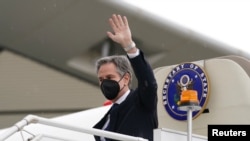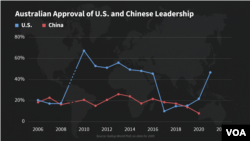U.S. Secretary of State Antony Blinken arrived in Australia on Wednesday on a trip aimed at reinforcing the Biden administration’s commitment to the Asia-Pacific and Indo-Pacific regions, while also focusing on the crisis in Ukraine.
On Thursday, Blinken participated in a town hall discussion of biomedical issues at the University of Melbourne’s law school. Officials with Moderna and Bristol-Myers Squibb, global pharmaceutical companies, also took part in the roundtable.
Blinken discussed global vaccination targets and the need for a “stronger global health security system” so the world is better prepared the “next time around.”
Earlier this week, Australia said it was reopening its borders to vaccinated international travelers on Feb. 21. The move comes almost two years after borders were closed as part of efforts to control the spread of COVID-19.
Australia’s pandemic border closures were among the strictest in the world.
Blinken said Australia and the United States have been “leaders together” in fighting COVID-19.
The secretary later tweeted that the University of Melbourne “held deep meaning to my late stepfather, Samuel Pisar, who was a proud alumnus.”
On Friday, Blinken will meet with leaders of the Quad countries, the United States, Australia, Japan and India.
Australian Foreign Affairs Minister Marise Payne, who will host the meeting, said Wednesday the gathering sends a message to China that security in the region remains a priority for the U.S.
Payne said the Quad ministers were “voting with their feet in terms of the priority that they accord to issues” important to the Indo-Pacific. Payne said the ministers would also focus on regional coronavirus vaccine distribution, cyber and other technology issues, and addressing disinformation, counterterrorism and climate change.
As Blinken traveled to Australia on Wednesday, he told reporters that he and the other ministers would discuss work that is important to “people throughout the region and around the world.”
“The Quad is becoming a powerful mechanism for delivering, helping to vaccinate a big part of the world, getting a lot of vaccines out there, strengthening maritime security to push back against aggression and coercion in the Indo-Pacific region, working together on emerging technologies and making sure that they can be used in positive ways, not negative ways, and an increasingly broad and deep agenda,” Blinken said.
He said the work among the four nations is similar to efforts supported by the United States in other parts of the world “building, energizing, driving different coalitions of countries focused on sometimes overlapping issues.” Blinken said those groupings allow countries to use their particular strengths to focus on important matters such as climate change, COVID-19 and emerging technologies.
Blinken’s visit to Australia is his first trip there after an enhanced trilateral security partnership known as AUKUS — Australia, the United Kingdom and the United States — was announced last September. The agreement includes a deal to build nuclear-propelled submarines for Australia as part of enhanced deterrence against China’s military expansion across the Indo-Pacific region.
Part of the discussions during the fourth Quad foreign ministers’ meetings in Melbourne “will relate to the challenges that China poses,” Daniel Kritenbrink, the assistant secretary of state for East Asian and Pacific affairs, told VOA during a Friday phone briefing.
“The Quad is not a military alliance, but it is not lost on China that you have four democracies, all with a strong maritime presence and advanced military capabilities, concerned by the increasingly aggressive approach China takes with its neighbors,” said Charles Edel, the Australia chair of the Washington-based Center for Strategic and International Studies.
Blinken is also expected to discuss threats presented by a growing partnership between China and Russia that was on display during Sunday’s meeting in Beijing between Russian President Vladimir Putin and Chinese leader Xi Jinping at the beginning of the Winter Olympics. The meeting occurred amid Russia’s military buildup along neighboring Ukraine’s borders and China’s increasingly assertive efforts to reunite Taiwan with the mainland.
In Beijing, Chinese officials have expressed wariness over the Quad and AUKUS.
In response Wednesday to a reporter’s question about the Quad members’ meeting, Chinese Foreign Affairs Minister Zhao Lijian attacked American democracy while portraying Beijing as a peace seeker.
“With its so-called democracy having collapsed long ago, the U.S. is forcing other countries to accept the standards of the American democracy, drawing lines with democratic values and piecing together cliques. That is a complete betrayal of democracy,” Zhao said.
Zhao added that China “seeks peace and development, promotes cooperation, promotes the construction of an equal, open and inclusive security system in the Asia-Pacific region that does not target third countries.”
“We oppose forming exclusive cliques and setting up groups within groups, as well as creating confrontation between camps,” he said.
The top U.S. diplomat’s weeklong trip includes Fiji as well as Honolulu, Hawaii.
VOA’s Chris Hannas contributed to the report.





